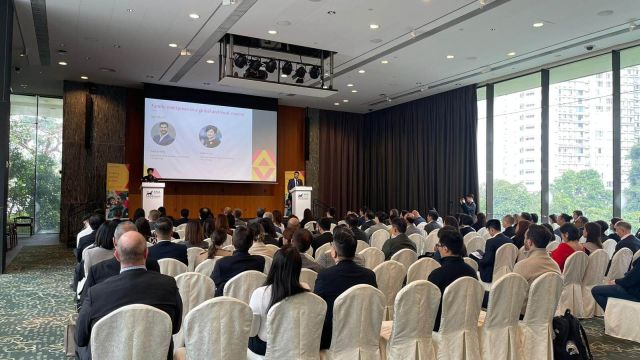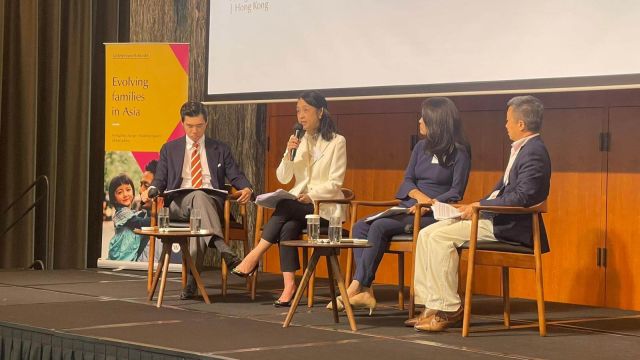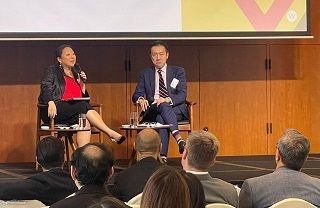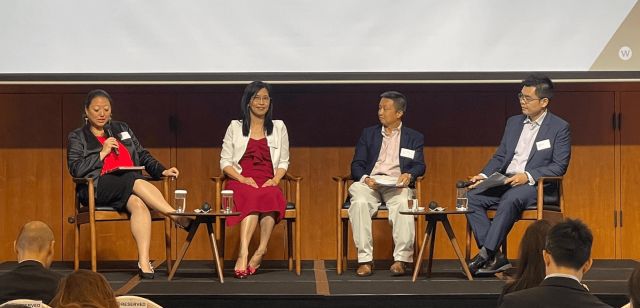Withersworldwide recently hosted its second conference in the 'Evolving Families in Asia' series, aptly titled 'The family enterprise: building and maintaining dynasties'. The event, held at the Asia Society Hong Kong Center, welcomed over 200 guests and reflected the significance of family enterprises and their growing influence on the current economic landscape in Asia. Here, we share some of the key areas of discussion from the conference.
Family enterprises in the global and local context
The conference touched on the evolution of Western family enterprises. These entities have transformed traditional structures, significantly influencing global industrial capitalism. Their strategies of innovation and dynamic adaptation set the tone for global impact.

Left to right: Mabel Lui (Head of Greater China commercial), Paul Jebely (Global head of aviation and marine)
In contrast, family businesses in Hong Kong are the foundation and backbone of the country's development. The thriving nature of these enterprises in Hong Kong can be attributed to several factors:
- Diversification of revenue streams
- Segregation of different streams for succession planning
- Early implementation of succession planning
- Establishment of robust family governance structures
- A strong inclination towards evolution and modernisation
An emerging trend was also discussed - the next generation's inclination to start new businesses, leading to a shift towards institutionalization and modernisation. This changes the focus from long-term growth to more contemporary business models.
Structure, legacy, and governance in family businesses

Left to right: Ethan Yu (Registered foreign lawyer), Deirdre Fu (Partner), Winnie Weng (Senior associate), Daniel Tang (Partner)
Strategies such as establishing separate entities for asset holding and operations in the initial stages are recommended for asset protection. The early involvement of the next generation in business operations is crucial for fostering interest and building experience.
Importantly, the necessity of shareholders' agreements was emphasized, promoting open communication among family members.
The use of trusts as an alternative tool for succession planning was also discussed, considering their benefits in segregation of the ownership vs management vs enjoyment of the family business for successive generations.
Having a system of family governance including a family constitution, setup of family council or committees to work in conjunction with the family trust is also important to promote family harmony and perpetuate the family holding of the businesses.
If the patriarch still holds shares in the family business, having a Will and Enduring Powers of Attorney to deal with such shares are actually the first steps in succession planning.
Pitfalls to avoid and navigating disputes
The event underscored the complexity of succession in family businesses, often leading to disputes involving control, shareholder rights, board composition, and post-founder financial irregularities.

Left to right: Sherlin Tung (Partner), Michael Chik (Partner)
The importance of trust structures in mitigating conflicts was acknowledged, albeit with limitations.
The preference for private settlements to maintain confidentiality and the use of arbitration to safeguard family and business integrity were key takeaways.
Future growth and diversification
The increasing popularity of investment funds as a means for diversification was noted, along with a cautionary note on the need for proper due diligence in fund management. Key considerations include:
- Ensuring fund managers are properly licensed
- Understanding the underlying asset classes
- Ensuring that fund terms align with market practices
- Addressing tax considerations early with appropriate structuring
- Being mindful of dealings with PRC counterparts, including approvals and withholding obligations
Hong Kong's position as a top investment city in Asia was highlighted, but with caution regarding the challenges and concerns in diversifying assets into real estate sectors. These include market volatility, illiquidity, management complexity, and regulatory risks. The importance of implementing risk management strategies, such as conducting market research, diversifying across different property types and locations, seeking professional advice, and understanding the strengths, weaknesses, and interests of the next generations, was emphasized.

Left to right: Sherlin Tung (Partner), Polly Chu (Partner), Daniel Tang (Partner), Simon Wong (Partner)
Reflections and takeaways
The conference provided a rich forum for discussion and insight into the evolving dynamics of family enterprises. It brought to light the challenges faced by these enterprises in a global context and the innovative strategies being employed to navigate these challenges. The emphasis on early succession planning, family governance, and adapting to modern business practices underlined the need for family businesses to evolve with changing times.
The discussions around dispute resolution and the importance of confidentiality in family enterprises were particularly important, highlighting the unique challenges these businesses face. The insights into future growth strategies, especially in the realm of investment and real estate, provided attendees with a comprehensive understanding of the opportunities and pitfalls in these areas.
Ultimately, the conference not only provided a platform for knowledge exchange but also fostered a sense of community among family enterprises in Asia. It underscored the importance of adaptability, strategic planning, and the need for a modern approach to traditional business practices. The event was a testament to the dynamic nature of family enterprises and set the stage for their continued evolution and success in the global business landscape.
The content of this article is intended to provide a general guide to the subject matter. Specialist advice should be sought about your specific circumstances.
We operate a free-to-view policy, asking only that you register in order to read all of our content. Please login or register to view the rest of this article.











